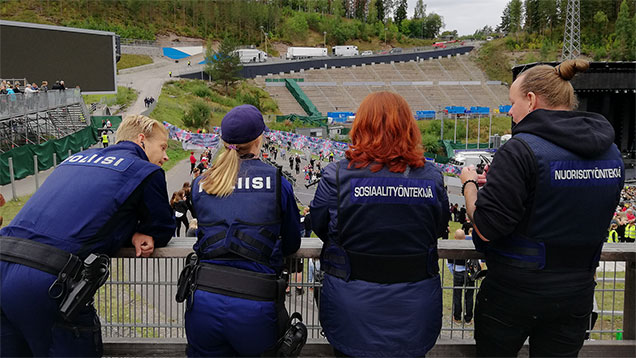Anchor work aims to help young people throughout Finland on the one-stop-shop principle

Regardless of where they live in Finland, young people must have the opportunity to receive help when, for example, they are displaying signs of criminal behaviour, use drugs or are exposed to possible radicalisation. The purpose of the new Anchor manual is to support professionals in their work, so that activities are standardised throughout the country. Anchor work refers to multi-professional cooperation targeted at children and adolescents to promote their wellbeing and prevent crime.
"Anchor work is conducted in teams consisting of police, social services and youth work professionals. A multi-professional approach produces results, because the young people in question or families subjected to domestic violence are assessed holistically, and the actions of the authorities combined to find a solution. Particularly in cases where problems have accumulated, services provided on the one-stop-shop principle are best," says Minister of the Interior Kai Mykkänen.
Anchor work can take place within a single municipality, or municipalities may enter into a cooperation agreement and provide services together. For small municipalities, it is advantageous to cooperate with neighbouring municipalities. In this way, the young people of these municipalities can be covered equally by the Anchor service.
"This year, we have strengthened prevention and family work by hiring around 40 new local police officers in Finland. The idea of Anchor work is at the core of their work. It is excellent that we are now obtaining an explanatory manual that will help make the model easier to build in new localities. It is also gratifying that educational actors will now be more closely integrated into Anchor work through this new manual. For many young people, a teacher can be the closest adult in life," says Mykkänen.
Manual supports the implementation, development and assessment of Anchor work
The manual now published aims to support the implementation, development and assessment of Anchor work in Finland. The manual is forward-looking and describes the Anchor model, which is based on research knowledge and good practices. The aim is to steer, support, and standardise Anchor work, so that young people have as equal as possible access to services nationwide.
In the manual, an Anchor work customer refers to a child or adolescent under 18 years of age who, for example, is displaying signs of criminal behaviour, uses drugs or is exposed to possible radicalisation into violent extremism (without age limit). A young person’s otherwise difficult life situation, such as experience of domestic and family violence, may also be involved.
Young people are the focus of Anchor work, parents are also supported
The focus of Anchor work is the young person in question, who is viewed as part of a social community. The aim is to support the young person’s independence and independent decision-making. Young people are supported so that they can make sustainable and responsible decisions for their own future.
Parents and guardians play a key role in Anchor work, because they have an important part to play in building and supporting the young person’s well-being. An effort must also be made to identify possible needs for parental assistance and support, so that help can be provided to solve the underlying causes of the young person’s actions.
Anchor work was launched in Hämeenlinna in the early 2000s, inspired by the need to develop multi-professional cooperation to promote the well-being of young people and prevent crime. From the perspective of professionals and young people, Anchor work was considered to be a meaningful and effective way for professionals in different fields of expertise to collaborate. The work was later expanded throughout the country via good practices.
Inquiries:
Tarja Mankkinen, Head of Development, Ministry of the Interior, tel. +358 40 595 57 60, [email protected]
Matti Airaksinen, Chief Inspector, National Police Board, p. +358 295 481 900, [email protected]
Tanja Moilanen, Researcher, University of Eastern Finland, tel. +358 46 92 32 850 [email protected]
Mari Kangasniemi, University Lecturer, University of Eastern Finland, tel. +358 50 470 4285 [email protected]

